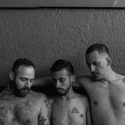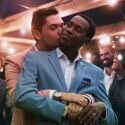
I’ve never been a flag-waving “God bless the U.S.A.” kind of guy, but spending most of 2018 traveling through the Balkans has made me rethink what it means to be gay and American. As I continue to contemplate it in my latest stop (Istanbul, Turkey), I’m so proud–and thankful–to be both.
Of course, things aren’t perfect for gay Americans back home. Both POTUS and SCOTUS are threatening some of the advances we’ve worked so hard to gain, but romance still blooms for us, and “happily ever after” can include both love and marriage–legal, state-protected marriage. Some may choose to stay in the closet, but many bust out and lead happy, fulfilled lives. Sadly, for many gays in Balkan countries that aren’t Greece, life may never be that good.
I’ve always thought of Europe as more progressive than the rest of the world, but when it comes to being gay, some of the eastern countries have more in common–or at least as much in common–with the notoriously homophobic countries of Africa and the Middle East than with the rest of the continent.
Of the dozens of gay men I’ve met in Serbia, Bosnia and Herzegovina, Croatia, Montenegro, Albania, Macedonia, Bulgaria, and Turkey, only a handful–if that many–have been out and proud gay men. Most, from twenty-somethings to forty-somethings, have been in the closet.
How about we take this to the next level?
Our newsletter is like a refreshing cocktail (or mocktail) of LGBTQ+ entertainment and pop culture, served up with a side of eye-candy.
“Does your mother know that you’re out?” The lyrics to ABBA’s 1979 hit have occasionally been on repeat in my head, and each time, I imagine a chorus of gay Balkan men shouting “Hell no!” in response.
I absolutely get it. Homosexuality is frowned upon in this part of the world, far more so that it is in Western Europe and in North America. But there’s a different layer to being closeted here. In the U.S., many gay men don’t come out because they’re worried about how it would affect their relationships with family and friends as well as their careers.
In parts of the Middle East and Africa, passing for straight can be about literal survival. When I was living in Sydney, I met a young man from Pakistan whose father tried to kill him when he was four years old by force-feeding him sleeping pills because he already suspected his son would grow up to be gay. (Thankfully, his mother walked in and saved his life.)
I’m sure those tangible fears keep some Balkan guys in the closet, but there seems to be something more ingrained holding them back, too. It’s almost like some are instinctively adhering to a status quo they’ve been conditioned to accept since birth. They’re in the closet as much out of habit as out of fear.
The result: Gay life here is markedly different than it is elsewhere in Europe. Although some of the bigger Balkan cities have “gay-friendly” places, outside of Belgrade and Greece, actual gay bars and clubs are rare to nonexistent.
Belgrade has a fairly decent-sized LGBTQ community, but the majority of gay men in Serbia still connect with each other through faceless profiles on Grindr and other apps, not just because it’s cheaper and easier than going out. It’s also better for the image they want to present to family and friends.
One of my favorite guys in Belgrade was Dušan, a 28-year-old architect who lived with his mother and was out to no-one. He said he couldn’t sample Belgrade’s gay nightlife because he was afraid he’d see someone he knows, thus endangering his carefully cultivated sexually neutral image.
It’s a story I heard over and over in my three months there, from guys who butched it up in public and avoided physical contact with me unless we were behind closed doors. Even their handshakes in front of my building felt kind of tentative.
Gay Pride is celebrated in most of the capital cities I’ve visited (and also in Thessaloniki, Greece, whose event I missed by one day), but gay pride isn’t really a year-round thing. Outside of Greece, there are no gay villages on par with New York’s Chelsea district, Chicago’s Boystown, L.A.’s WeHo, San Francisco’s The Castro, London’s Old Compton Street, Cape Town’s De Waterkant neighborhood, Bangkok’s Silom Soi 2 and Soi 4, and Sydney’s Oxford Street. Grindr is not so much a gay option as a gay lifeline.
I’ve written a lot about my various Grindr misadventures, and there have been moments when I wished the app had never been invented. Then I arrived in Istanbul. The last time I visited the Turkish city was in 2010, pre-Grindr, so I was looking forward to checking out all of the hot Turkish guys I’d no doubt find on the grid.
As the messages came in, I was unable to read them, and I couldn’t see any of the profile photos on the grid besides my own–no faces, no torsos, no landscapes, no anything. After doing a bit of sleuthing? (which was basically Google-ing “Grindr” and “Turkey”?), I discovered that Grindr, like Wikipedia, is blocked by the government, which has also banned Gay Pride for the past four years, citing security concerns (yeah, right). In order to gain full access to either, I’d have to install a VPN.
Istanbul does have what can pass for a gay scene. Still, if you want to meet the guys in hiding, your best bets are downloading Hornet or installing a VPN, which is what I ended up doing. Grindr is as frustrating as ever, but I’ll never again take the ability to use it for granted as an inalienable gay right.
If I’ve gained anything as a gay man on my ongoing Balkan adventure (next and final stop: Romania) besides the benefits of a good VPN, it’s more gratitude for the freedom to be out back home and just as much compassion for those here who decide to stay in.


















jkb
Both fascinating and sad
RichInIowa
I have been ‘mentoring’ a guy in university in Sofia Bulgaria for about two years, and the first-hand things I have learned from him about the non-existent gay existence in the Balkans is really terribly depressing.
And sadly for these countries, he can’t wait to graduate and move to Germany, adding to the terrible population loss and education-drain of these places, leaving only the old and “redneck” bigot types to live and govern there.
truckproductions
I feel the same way about gays in Iowa..
Me2
Hmm, sounds exactly how I’d imagined eastern Europe to be: depressing and repressed.
niles
Give it time. The United States is turning into the same hellhole or worse than all those countries combined. You have no idea. No idea at all.
gymmuscleboy
All other western countries are being ruined through mass migration, too. We have the left to thank for this masturbatory virtue signalling. Unfortunately we are being raised to believe that US and western values are nothing special, and in fact evil – they believe we must blur out our “privileged whiteness” until our culture is indiscernible. Zombies.
DCguy
The author says the following….
“I’ve always thought of Europe as more progressive than the rest of the world, but when it comes to being gay, some of the eastern countries have more in common–or at least as much in common–with the notoriously homophobic countries of Africa and the Middle East than with the rest of the continent.”
———-
A quick study in history would have told them that the one thing all the countries in eastern Europe have in common in addition to homophobia is that they were all former under the control of extremely homophobic Russia.
Seth
While I certainly feel compassion for anyone in these countries where life is so dangerous for those who just want to be themselves, I’m beyond tired of the trope that since I’m not being tossed off a roof or lit on fire then I should just shut up and take whatever this country has to dish out to me. Fuck that.
Aires the Ram
As they say, when you travel and learn about other lands & cultures, you expand your mind, you expand it so that when you come back home, you look at “home” through a different set of eyes. All these gay people here in the US complaining and carrying on about Trump, would do well to visit someplace else, like the author has done, to appreciate the fact that life for a gay person here in the US is pretty damn good, no matter if the person you voted for, for President, won or lost.
Mick406
Great response, Aires. Yes, I think we ALL should be grateful for what we’ve got here in this country.
Most problems are imagined. I see all kinds of griping from every direction, whether it be gay rights, or women’s rights, or race rights . . . . all kinds of groups and angry people. I just wish everyone would step back and be thankful for what we DO have! Obama or Trump will not make your life for you. 90% of the accusations about what the politicians are going to do to you are not factual.
The other story on this page, about mustering out all personnel in the military who are HIV . . . well, that’s not only a premature story but it didn’t dig all the way to the facts. When I served in recent years, I too was put on a ‘non-deployable’ list, and I had 12 months to change things or I was going to be put out of the Army. I was over-weight. The Army felt they didn’t need a fat person in their 50’s over in the heat of the Middle East having heart attacks. It’s the same with the HIV persons. Not just medical risk, but too many medical NEEDS.
I cannot substantiate this, but from what I continue to read in my military updates I still receive, only HIV personnel who have extraordinary medical needs are to be affected. Just like me being fat, the medical condition of some people with HIV would be a detriment on the battlefield. So, the story has everyone up in arms about this unfair treatment. Before everyone goes ballistic, make sure you know the WHOLE story.
I’m afraid some HIV people are being misleading in their posturing. I didn’t like being deemed ‘unhealthy’ for service, but I had to accept it. These people should too. And by the way, there are ways of getting around being ‘non-deployable’. You can change your MOS to non-combat or combat supportive, or work your way into a position that is only operable state-side. There ARE ways around this. When it is all said and done, that estimated 1,200 people who will lose their military jobs will drop down drastically after medical screening. Only those with medical ‘profiles’ will have to leave or change jobs. The military has 5 Medical Profiles. Only those with a “1” can be deemed combat deployable. I’m sure some of these HIV people will have a “1” and can continue doing what they are doing. Only those with ancillary medical problems will become “non-deployable”.
DCguy
Oh look, two of the anti-lgbt troll screenames are doing the same thing where one says something bigoted and immediately the other screename comes in to support it.
Basically what the anti-LGBT trolls want is to say……
Hey American LGBTS, since you aren’t being shot on the street you shouldn’t complain about ANYTHING That happens to you here.
This is exactly what people who hate us want.
The thing they leave out is this. If things are better for us here in America it’s because we DIDN’T sit down and shut up.
Aires the Ram
@DCguy: Normally I consider you unworthy of response, but you’ve gone way too far by calling people whom you do not even know, “anti-lgbt trolls”. You have no idea what our lives are, or have been over the years. Nobody said, not even once, that we have it good as gay people in this country because of many who came before us who fought for what we have. I just don’t feel the need to mention a fact that anybody OUGHT to already know, in every goddamn post. When you call us anti-gay trolls, you’re looking in the mirror. Perhaps you, as the author has done, need to get out of the basement a bit more.